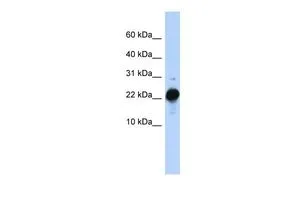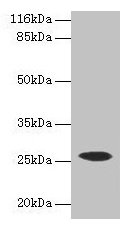
WB analysis of human placenta tissue using GTX47094 CSHL1 antibody at 0.2-1microg/ml.
CSHL1 antibody, C-term
GTX47094
ApplicationsWestern Blot
Product group Antibodies
TargetCSHL1
Overview
- SupplierGeneTex
- Product NameCSHL1 antibody, C-term
- Delivery Days Customer9
- Application Supplier NoteWB: 0.2-2.5 ug/ml. *Optimal dilutions/concentrations should be determined by the researcher.Not tested in other applications.
- ApplicationsWestern Blot
- CertificationResearch Use Only
- ClonalityPolyclonal
- Concentration0.5-1 mg/ml
- ConjugateUnconjugated
- Gene ID1444
- Target nameCSHL1
- Target descriptionchorionic somatomammotropin hormone like 1
- Target synonymsCS-5, CSHP1, CSL, GHB4, hCS-L, chorionic somatomammotropin hormone-like 1, chorionic somatomammotropin CS-5, epididymis secretory sperm binding protein, growth hormone B4, growth hormone cluster
- HostRabbit
- IsotypeIgG
- Protein IDQ14406
- Protein NameChorionic somatomammotropin hormone-like 1
- Scientific DescriptionThe protein encoded by this gene is a member of the somatotropin/prolactin family of hormones which play an important role in growth control. The gene, along with four other related genes, is located at the growth hormone locus on chromosome 17 where they are interspersed in the same transcriptional orientation; an arrangement which is thought to have evolved by a series of gene duplications. Although the five genes share a remarkably high degree of sequence identity, they are expressed selectively in different tissues. This particular family member is expressed in placental villi, although it was originally thought to be a pseudogene. In fact, alternative splicing suggests that the majority of the transcripts would be unable to express a secreted protein. Alternatively spliced transcript variants encoding different isoforms have been identified. [provided by RefSeq, Jul 2008]
- Storage Instruction-20°C or -80°C,2°C to 8°C
- UNSPSC12352203


